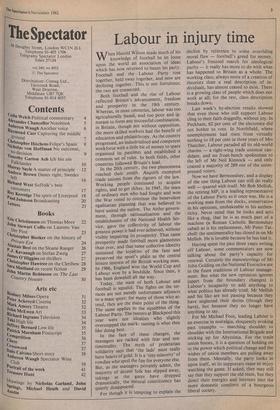Labour in injury time
When Harold Wilson made much of his knowledge of football he let loose upon the world an association of ideas which has now returned to haunt his party. Football and the Labour Party rose together, held sway together, and now are declining together. This is not fortuitous; the two are connected.
Both football and the rise of Labour reflected Britain's advancement, freedom and prosperity in the 19th century. Whereas, in most countries, labour was too agriculturally based, and too poor and ig- norant to form any successful combination, in Britain, though not without opposition, the more skilled workers had the benefit of education and philanthropy. As the country progressed, an industrialised and competent workforce with a little bit of money to spare organised its pastimes and established a common set of rules. In both fields, other countries followed Britain's lead. In the 20th century, the two phenomena reached their zenith. Asquith exempted trade unions from the rigours of the law. Working people continued to acquire rights, and to get richer. In 1945, the mass of ordinary men who had fought and won the War voted to continue the benevolent egalitarian planning that was believed to have united the nation. The Attlee govern- ment, through nationalisation and the establishment of the National Health Ser- vice, gave the collectivity of labour the greatest power it had ever achieved, without visibly impairing its prosperity. That same prosperity made football more glamorous than ever, and that same collective identity sustained the loyalties of the fans and preserved the sport's plate as the central leisure interest of the British working man. In 1966, England won the World Cup and Labour won by a landslide. Since then, it has been downhill all the way.
Today, the state of both Labour and football is squalid. The fights on the ter- races are not merely unfortunate adjuncts to a mass sport: for many of those who at- tend, they are the main point of the thing. The same applies to the squabbles of the Labour Party. The ranters at Blackpool this year were not idealists who slightly overstepped the mark: ranting is what they like doing best.
In the face of these changes, the managers are racked with fear and sen- timentality. The myth of proletarian solidarity says that 'the lads' must really have hearts of gold. It is a 'tiny minority' of rowdies who spoil the fun for everyone else. But, as the managers privately admit, the majority of decent folk has slipped away, takings at the gates have dropped dramatically, the natural constituency has quietly disappeared. For though it is tempting to explain the decline by reference to some overriding moral flaw — football's greed for money, Labour's frenzied search for ideological purity — it really has more to do with what has happened to Britain as a whole. The working class, always more of a creation of theorists than a real description of in- dividuals, has almost ceased to exist. There is a growing class of people which does not work at all; for the rest, class description breaks down.
Last week's by-election results showed that even those who still support Labour cling to their faith doggedly, without joy. In Peckham, 62 per cent of the electorate did not bother to vote. In Northfield, where unemployment had risen from virtually nothing to 18 per cent in three years of Mrs Thatcher, Labour paraded all its old-world charms — a right-wing trade unionist can- didate, and no front-bench spokesman to the left of Mr Neil Kinnock — and only coaxed a majority of 289 out of the unim- pressed voters. Now we have Bermondsey, and a display of the one thing Labour can still do really well — quarrel with itself. Mr Bob Mellish, the retiring MP, is a leading representative of the Labour Party as it once was. He is a working man from the docks, conservative in his opinions, unshakeable in his authen- ticity. Never mind that he looks and acts like a thug, that he is as much part of a machine (a Roman Catholic Bermondsey cabal) as is his replacement, Mr Peter Tat- chell: the sentimentality has closed in on Mr Mellish. He is lovable because he has had it.
Having spent the past three years writing off Labour, some commentators are now talking about the party's capacity for renewal. Certainly the manoeuvrings of Mr John Golding on the National Executive are in the finest traditions of Labour manage- ment. But what the new optimism ignores (apart from the boundary changes) is Labour's incapacity to add anything to what politics has already tried. Mr Mellish and his like are not passing because they have neglected their duties (though they have), but because they no longer have anything to say.
For Mr Michael Foot, leading Labour is an exercise in nostalgia, eloquently evoking past triumphs — marching shoulder to shoulder with the International Brigade and sticking up for Abyssinia. For the trade union bosses, it is a question of holding on to the power which political change and the wishes of union members are pulling away from them. Mentally, the party looks in upon itself, so its supporters cease to enjoy watching the game. If asked, they may still say that they support the old team, but they direct their energies and interests into the more domestic comforts of a bourgeois liberal society.














































 Previous page
Previous page